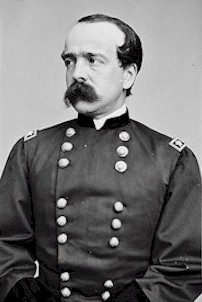Get Today in Masonic History into your Inbox. Sign up today for one of our email lists!
Need an article for your Trestleboard/Newsletter see our Use Policy
Daniel Adams Butterfield is Born

Today in Masonic History Daniel Adams Butterfield is born in 1831.
Daniel Adams Butterfield was an American soldier and businessman.
Butterfield was born on October 31st, 1831 in Utica, New York. He attended Union Academy. In 1849 he graduated from Union College in Schenectady, New York. After graduating he studied law, he was too young to sit for the exam though, so he toured the country. His father started Butterfield, Wasson and Co. which became American Express.
After Butterfield returned to Utica, he joined the Utica Citizen's Corps as private. He worked in various businesses in New York and in the south. He also worked for American Express. Prior to the American Civil War, he became the superintendent of the eastern division of American Express in New York City.
In New York City, Butterfield joined the seventy-first regiment of the New York militia before transferring to the Clay Guards of Washington, D.C. Before long he transferred again to the Twelfth New York Militia as a colonel.
While in the Army during the Civil War, Butterfield is credited with the creation of various items. In 1862, he wrote an Army field manual called Camp and Outpost Duty for Infantry. He is also credited with creating the song Taps which was rapidly adopted by both the Union and Confederate armies. It replaced the standard three shot salute at funerals and was also adopted for lights out in the Army. In modern times Butterfield's composing Taps has been called into question. Some military and music historians believe Butterfield merely re-worked an existing piece called Scott Tattoo rather than composing a new piece himself. He is also credited with creating unit patches. It was briefly used by one general in his unit, it was Butterfield who made it an Army wide tradition.
Butterfield also had his issues during the Civil War. He became very close with Major General Joseph Hooker and became his chief of staff. Many other officers did not like Butterfield because of the behavior he and Hooker portrayed. It was said Hooker's headquarters was more of a "bar and brothel" rather than military headquarters.
After the war, Butterfield was appointed Assistant Treasurer of the United States. In the position he was caught selling information to speculators regarding the price of gold, specifically he told individuals when the United States Government was going to sell gold. President Ulysses S. Grant was the one who discovered the scheme when he sold $4,000,000 in gold without telling Butterfield. Butterfield resigned from the position.
Butterfield returned to the private sector, including a job as an executive with American Express.
Butterfield passed away on July 17th, 1901. He is buried at the West Point cemetery, although he never attended the school.
Butterfield was a member of Metropolitan Lodge No. 273 in New York City, New York.

